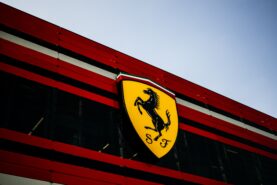New in our Shop: The Power and The Glory - Senna & Prost

French Resistance: The 1988 French Grand Prix
Of their many head-to-heads during their battle for F1 supremacy in the late 1980s and early 1990s, Ayrton Senna and Alain Prost’s confrontation at the 1988 French Grand Prix was arguably one of their most intense ever. A new book due to be published in February, ‘The Power and The Glory: Senna, Prost and F1’s Golden Era,’ relates the story of this and many other clashes between F1’s all-time heavyweight super-team during that unforgettable era of Grand Prix racing.
When the teams arrived at an impossibly hot Circuit Paul Ricard for the seventh round of the 1988 world championship, Alain Prost was certainly feeling the heat in more ways than one. Early July and the south of France was sizzling under a summer heatwave.
Not only this, but the Frenchman’s new team-mate, a certain Ayrton Senna, had just won the previous two Grands Prix in North America with something to spare. These performances had followed hard on the heels of a Monaco Grand Prix in which the formidable Brazilian had humiliated the French ace, until an inexplicable error had eliminated him late in the race. The new recruit was coming on strong, very strong. Mclaren’s double world champion was having to dig deep within himself, for Ayrton Senna had arrived at Mclaren with just one aim: to depose the Frenchman from the top of the F1 pedestal.
Six races into 1988 and F1’s weather watchers reckoned the Brazilian was doing just that. Despite a splendid victory in Mexico City in round four, for the first time in his professional career Alain Prost was on the back foot. At Ricard, he walked into a pressure cooker. The French media and public were fully expecting their man to tame the young upstart, to re-assert himself as F1’s Grand Master.
A couple of Rottweilers fighting over a bone, the battle for pole position became fierce. By taking his seventh pole on the bounce here in France, from a purely psychological view Ayrton knew that while such a feat would not kill off his foe, it would certainly wound him. Alain just wanted to beat his superfast team-mate in qualifying for the first time in 1988 – a whole lot easier said than done.
Sliding into the cockpit of his MP4/4 under a punishing Provencal sun, the professor decided to throw caution to the wind. He had to make a point here in front of his fellow countrymen: he had to beat Senna at all costs. And beat him he did. A locked wheel, here, puff of smoke there – he might have looked his usual silky smooth self, but the Frenchman was hanging it out at Ricard, on the very edge of adhesion. It worked. Prost took his first pole of the year by almost half a second . . .
“The way he drove I think he deserved pole,” a smarting Senna told the media, quickly adding, “For the race though I am very happy. I feel it will be a good race tomorrow. Fun.”
The superb weather continued into Sunday with clear blue skies over Le Castellet as far as the eye could see. They come from far and near, an army of tri-colore waving fans. Allez Prost! The fightback started today, 3rd July 1988.
Lining up on the grid on a scorching afternoon, the winner of the 1988 French Grand Prix would clearly be a Mclaren-Honda, but which one? The Mediterranean air crackled with tension. Just moments to the green light and the pole-sitting Mclaren seemed to creep forward. His nerves jangling, Prost had almost blown it; another few inches would have resulted in a penalty.
Red, Green, Go! The Mclarens led the field into the first corner.
Gritty, steely and focused, Prost immediately put the hammer down. The Mclarens soon dropped Berger’s third-placed Ferrari. The pace was absolutely scintillating. As early as the lap 4 Prost set a 1”11.7 – just one tenth off what would prove to be his fastest lap of the race! If he was trying to break the will of his team-mate, it wasn’t working. Senna was hanging in there, just. A few laps later the Brazilian recorded a 1”11.8, his fastest lap of the whole race! Brutal: the world’s two greatest drivers intent on breaking one another’s spirits on this hot, dusty afternoon. The gap between the superstars would ebb and flow all day:
Senna Prost Gap
Lap 1 1”16.0 1”14.9 +1.1
Lap 2 1”12.9 1”12.4 +1.6
Lap 3 1”12.5 1”12.5 +1.6
Lap 4 1”13.2 1”11.7 +3.1
Lap 5 1”12.4 1”12.1 +3.4
Lap 6 1”11.9 1”11.8 +3.5
Lap 7 1”12.1 1”12.2 +3.4
Lap 8 1”11.8 1”12.1 +3.1
Lap 9 1”12.1 1”12.3 +2.9
Lap 10` 1”12.0 1”12.3 +2.6
“I felt I had to go hard all the time,” Prost would later remark. “At a place like this with such a short lap, there are constantly slower cars to be lapped, and Senna is very good in that situation.”
Lap after lap the Mclaren-Honda steamroller marched on. The race was on a knife-edge, the gap between the two cars never more than a couple of seconds. Try as he might the Brazilian never could get close enough to launch an assault. As expected the French Grand Prix had become a stand-off between the Mclaren team-mates, a shoot-out in the dusty, arid desert that is Paul Ricard.
Perhaps the pit-stops would break the stalemate up front?
Six, seven, eight seconds… The number 11 MP4/4 stood motionless. A problem! Nine, ten seconds… Prost could only sit and wait. Sheer frustration. Meanwhile Ayrton Senna blasted down the 1.8km Mistral straight to take the lead! Thanks to a quicker stop, the Brazilian had the lead.
“I was disappointed about that,” Prost would say, “because I did not think it was fair to be second this way.” To win his home race, Alain Prost knew all he had to do was catch and pass the fastest, toughest, most uncompromising racer in the world: Ayrton Senna. Time for a deep breath.
The chase was on. Paul Ricard held its breath as Prost dragged himself back into contention. By lap 51 the Mclarens were running in formation, lapping to within hundredths of a second of one another:
Senna Prost
Lap 57 1”12.640 1”12.680
Lap 58 1”12.220 1”12.239
Lap 59 1”12.384 1”12.277
Lap 60 1”12.406 1”12.403
“Economy mode! Economy mode!” Ron Dennis was shouting himself hoarse over the pit-to-car radio. Honda technicians looked worried. If the gladiators were to continue at their current pace, they’d run out of fuel before the flag. Silence. Neither Senna nor Prost replied. A resigned Ron Dennis shrugged. Just how do you manage the greatest driving team the sport has ever seen?
Senna v Prost: a fight to the death.
Lap 61, a five car snake entered the Mistral straight. Nelson Piquet was looking to lap a couple of backmarkers. A little further back, Senna and Prost were gobbling up the tarmac, about to put another lap on Nelson and the two cars in front of the Lotus.
Next up the 140mph Le Beausett corner. Having breezed past his compatriot, Senna was catching the Dallara and the Minardi hand over fist. It was going to be tight . . .
Whoosh! It happened in the blink of an eye.
From seemingly nowhere, Prost had come catapulting down the inside of the corner, to seize the lead! “I just nailed it down the inside of him,” would grin an exuberant Prost afterwards. It had been a split-second decision – one made at 180mph. Correctly predicting that the leader might just find himself boxed in behind the slower cars as they negotiated the right hander, Prost had decided to claim the inside line knowing full well his team-mate would have nowhere to go. It worked like a dream. Pure opportunism. Prost leads! Vive La Republic!
Sensing perhaps that today was not his day, Senna wisely backed off. Later he would talk about a ‘spongey’ gearbox. Nevertheless, the Brazilian was philosophical in defeat: “It was Alain’s day. I did my best but it was not good enough.”
With this magnificent victory on home soil, the professor had achieved two things: not only had he consolidated his world championship lead, he had sent a very clear message to the Brazilian hotshot: Alain Prost still had it.
The French Grand Prix had been total war, physical and psychological. Alain Prost’s joy however would be short-lived. Reeling from defeat, Ayrton Senna would come back harder, stronger and even faster than ever. The battle for the 1988 Formula One heavyweight championship of the world was about to get serious.
By David Sedgwick
✅ Check out more posts with related topics:













LAST 3 F1 Fan COMMENTS